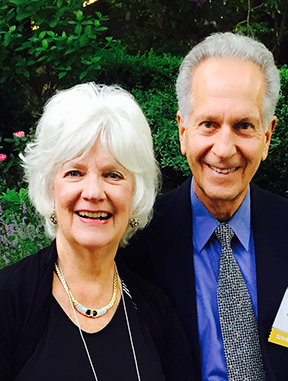Gift establishes annual colloquium, recognizes Sandra Edwards’ contributions to OT profession
By Jill Pease
Al Garcia wanted to give his wife, Sandra Edwards, a gift that was truly unique.
“I’ve seen husbands give their spouses diamonds or jewelry, but I wanted to do something that has different value and will be here long after we’re gone,” Garcia said.
With his donation to UF to establish the Sandra Edwards Colloquium in the department of occupational therapy, Garcia honors her decades-long career in occupational therapy practice, education and research while providing an important resource for faculty, students and alumni.
“We believe this investment is something that can live on and help a lot of other people in ways we can’t even understand,” said Edwards, M.A., O.T.R., FAOTA, a UF OT alumna and an occupational therapy professor emerita at Western Michigan University. “It’s much bigger than us.”
The annual Sandra Edwards Colloquium will bring a leading expert in occupational therapy or a related discipline to UF for a guest lecture and meetings with faculty and students.
“This colloquium will enable us to explore issues that affect occupational therapy education, research and practice,” said Joanne Foss, Ph.D., OTR/L, the interim chair of the UF department of occupational therapy and director of the master’s in occupational therapy program. “We would like to invite speakers that promote innovation.”
As the first occupational therapy educational program in the Southeast when it opened in 1958, the UF program has a long history of innovation. Edwards, a Gainesville native and 1965 UF OT graduate, was drawn to the profession for its combination of science and creativity. As a student, she learned from strong female role models, including the department chair, Alice Jantzen, Ph.D., and received sophisticated instruction in anatomy, neurology, orthopedics and psychology.
“All of that training served me very well,” Edwards said. “It was an excellent foundation and I really was able to stay ahead of the pack as a result of it.”
Following graduation, Edwards worked for eight years, primarily in pediatrics, in Boston and California and earned a master’s degree in special education from Western Michigan University in Kalamazoo and clinical certifications from Stanford University, Sensory Integration International and Ranchos Los Amigos Rehabilitation Hospital. With her education and clinical experience, Edwards was well positioned for her next professional move: serving on the occupational therapy faculty at Western Michigan University.
The author of numerous articles published in peer-reviewed OT, medical and engineering journals, Edwards and a former graduate student wrote a chapter in the book “Hand Function and the Child” on the hands of children with Down syndrome. In 2002 she and two former occupational therapy students released the book “Developmental & Functional Hand Grasps,” published by SLACK Books.
Edwards also collaborated with members of Western Michigan’s department of computer and electrical engineering to develop uses for a robotic arm joined to a computer in a haptic, or touch, interface. The team designed software for children with various disabilities, including problems with visual learning, perception and handwriting.
Now in retirement, Edwards is able to pursue some of her other creative pursuits, including world travel, piano performance and visual arts.
Edwards and Garcia, an MIT-trained chemical engineer who retired as director of the bioprocess research and development unit at Pfizer’s facility in Kalamazoo, have also been active in philanthropic efforts, contributing to arts and community groups, as well as the scholarship established in Edwards’ name at Western Michigan. When Edwards and Garcia traveled to Gainesville last fall for Edwards’ induction into UF’s Grand Guard Society, the timing was right to make a donation to the department of occupational therapy.
“Our vision for the gift is that the colloquium speakers will help bring to the University of Florida the kind of diversity of ideas that can only add strength to any educational endeavor,” Garcia said.
The gift is a fitting way to recognize the university and profession that have meant so much in her life, Edwards said.
“Joy, love and compassion are so important and our profession has the opportunity to make that happen with people,” she said. “You work for that in your family, but to have that professionally, it’s extraordinary. I think occupational therapy is a wonderful profession, I really do.”

